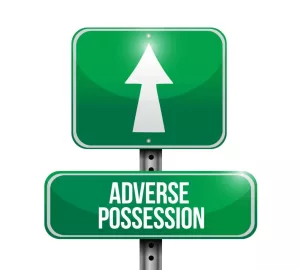Adverse Possession – The Utimate Guide
Go Back To Previous PageAdverse possession is commonly associated with squatters gaining ownership of a property. They live there for an extended period and meet the legal requirements to claim adverse possession. But the legal  doctrine is far more nuanced. Even a neighbor who puts up a fence three feet over the boundary line or a neighbor who has been using your garage for several years without your permission could make the legal argument that they now own the property over the boundary line or garage, even though they don’t.
doctrine is far more nuanced. Even a neighbor who puts up a fence three feet over the boundary line or a neighbor who has been using your garage for several years without your permission could make the legal argument that they now own the property over the boundary line or garage, even though they don’t.
The specific requirements for adverse possession can vary slightly by jurisdiction. Generally, the five critical criteria involve the property being occupied in a hostile, exclusive, open, notorious manner, actual, and continuous manner.
What Is Adverse Possession?
Adverse possession is a legal doctrine that allows an individual to claim ownership of a property that belongs to someone else. Adverse possession laws permit a trespasser to enter and occupy another person’s property for a specified period, ultimately enabling them to assert legal ownership.
This process is defined as adverse possession.
Trespassers do not need to intend to permanently possess the property when they first enter it to claim adverse possession.
Additionally, trespassers can take possession of just a tiny portion of the entire property. In some cases, adverse possession can occur because of an honest mistake. For instance, a neighbor might mistakenly extend their backyard onto the neighboring property because of an incorrect deed or a misunderstanding.
Essentially, the doctrine of adverse possession promotes the productive use of land and penalizes property owners who do not promptly exercise and enforce their property rights.
What Are the 5 Elements of Adverse Possession?
- Hostile
- Actual
- Open and notorious
- Exclusive
- Continuous occupancy of the property for a specific amount of time
1. Hostile Claim
To establish a claim for adverse possession, the use of the property must be hostile and opposed to the interests of the true owner of the property.
This means that if the adverse possess legal property owner has allowed someone to use the property, that use cannot be classified as hostile. Courts throughout the United States typically follow one of three definitions of what constitutes “hostile” in the context of adverse possession.
- Awareness of Trespassing. The trespasser understands that their use of the property constitutes trespassing and that they have no legal right to access it.
- Good Faith Mistake. This rule applies when the trespasser genuinely believes they have a right to the property, often because they rely on an invalid deed.
- Straightforward Occupation. This rule defines “hostile” as simply occupying someone else’s land. The trespasser is not required to know that the property belongs to another person. This is the most commonly accepted definition of “hostile.”
2. Actual Possession of the Land
Most jurisdictions require that a trespasser demonstrate actual possession of the land, meaning they must be physically present on the property and treat it as the owner.
A trespasser can typically prove this by showing evidence of efforts to renovate, maintain, or improve the property. This can include paying local property taxes for ten years or more in states like New York.
3. Open and Notorious Possession
In addition, the trespasser’s occupancy must be “open and notorious.” This means that the trespasser’s use of the property should not be hidden; it should be evident to anyone looking for it.
It’s important to note that the property owner can use actual knowledge of the trespasser’s occupancy to be considered open and notorious.
4. Exclusive and Continuous Possession
To qualify for adverse possession, the occupant must exclusively occupy the land. This means the land cannot be shared with the public, another person, or the rightful owner. The occupancy must be continuous and uninterrupted; the trespasser cannot use the property temporarily and then return later to claim adverse possession according to the state’s statutory timeframe.
Additionally, the adverse possessor must use the property in a way that aligns with its intended purpose. For instance, a farm must be used consistently as a farm all year round.
5. Time Requirements
Each state has its requirements for how long a trespasser must occupy a piece of land before they can claim it under that state’s adverse possession laws. This time frame can range from three to twelve years.
In several states, a trespasser can add their adverse possession claim to that of a previous possessor as long as there is no gap between the two occupants. Additionally, the statutory period will not begin to run if the property is incarcerated or mentally incapacitated.
How Do You Gain Ownership of a Property Via Adverse Possession?
Each state has its legal criteria for a viable adverse possession claim. So, you must consult your state laws regarding adverse possession for more detailed information if you are okay with it.
Also, please remember that some states, such as New York, require the trespasser to pay local property taxes on the land for a specified duration; this period is 10 years in New York.
Is Adverse Possession Automatic?
In most states, adverse possession is not granted automatically; a court must award it. Disputes over property ownership typically arise when the presumed owner attempts to sell the property or transfer ownership.
When a title company investigates a property’s chain of title, it may encounter issues that cloud the title, leading it to refuse to issue insurance for the title transfer. If the parties involved cannot settle, the case may proceed to court.
Therefore, adverse possession claims are not automatic and must be substantiated in court before the court will grant possession of the property to the adverse possessor.
How to Prevent Adverse Possession of Your Property
1. Check On the Property
The best way to prevent an adverse possession claim against your property is to check on it often and avoid trespassers in the first place.
In other words, as a property owner, you should constantly monitor your property.
2. Contact the Police If You Have Trespassers
If you suspect someone is trying to claim your property through adverse possession, call the police if the trespasser refuses to leave after you have warned them.
Next, check to see if they have made any tax payments on your property.
3. Post Signs
Property owners can enhance their security by posting “no trespassing” signs and blocking entrances with gates, fences, and other barriers.
Displaying signs can effectively deter trespassers. However, it does not protect you from an adverse possession claim. This means you must always know who is using or occupying your property.
4. Hire an Attorney and start legal action
Hiring an experienced real estate attorney will help you resolve the issue if all else doesn’t work. In the worst-case scenario, you may need to file a case to remove the trespasser from your property. Similarly, you might have to file a petition with the court to have a structure removed from your land.
Acting immediately before the trespasser establishes a valid adverse possession claim is essential.
This means they must have occupied the property for a sufficient length of time, as defined by your state’s laws, to claim ownership potentially.
Adverse Possession Bottom Line
To successfully claim adverse possession, a person must prove that they have used the property in an actual, open, notorious, exclusive, hostile, and continuous manner for the statutory period defined by the jurisdiction.
These strict requirements are designed to balance the rights of property owners with the interests of squatters who may have developed a legitimate claim to the land through long-term use. If you are considering making an adverse possession claim or a property owner facing such a claim, it would be best to consult with a real estate attorney.
They can provide guidance on the specific laws and requirements in your area.


